The reason many people prefer epoxy garage floors is that it requires low maintenance. Epoxy floors are also known for their durability and stain resistance. Even though epoxy floors are one of the best garage floors you can have, they still need a good treatment to last long. In comparison with resin floors, those are not resistant to aggressive chemicals.
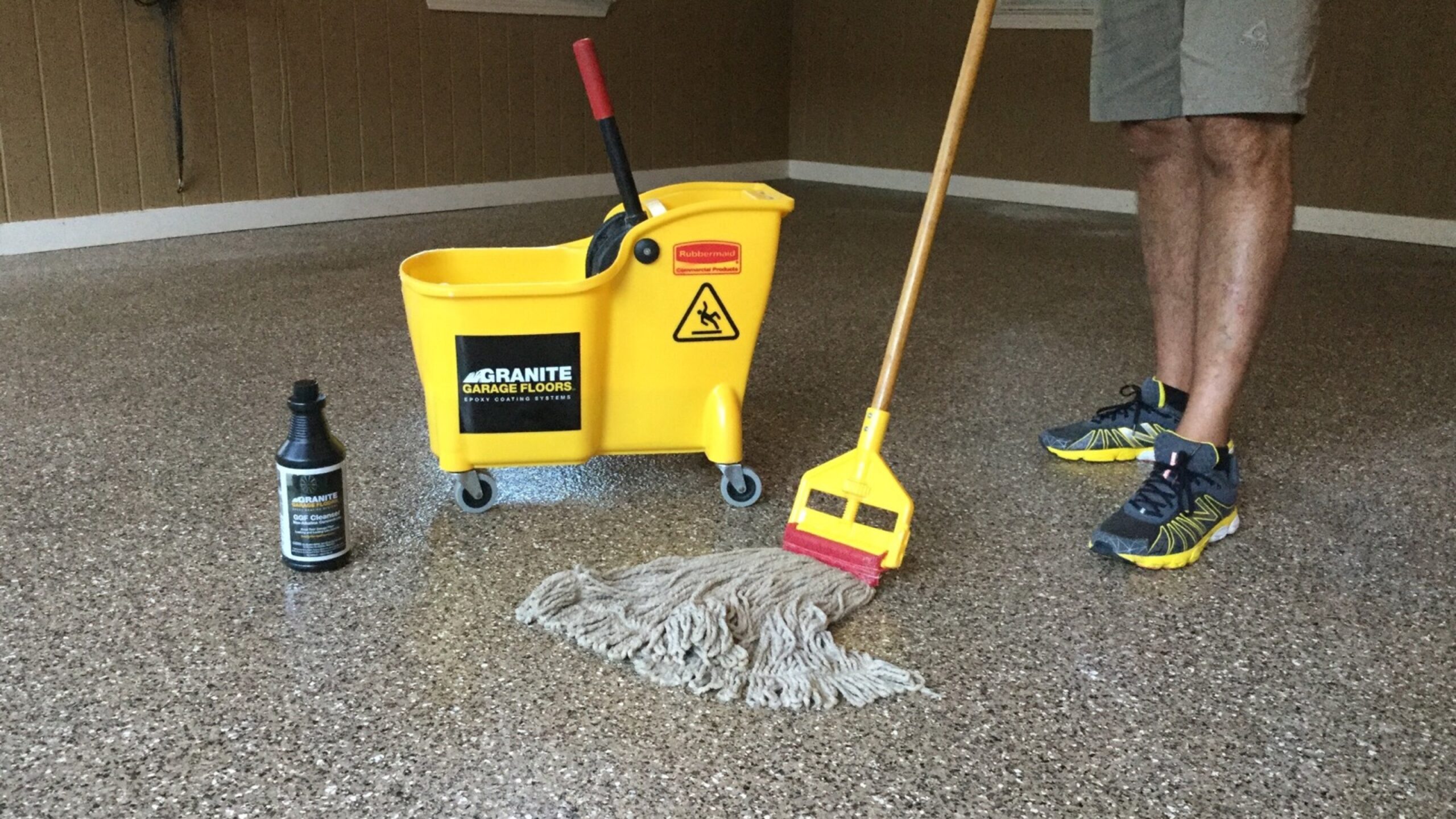
If you have an epoxy floor coating, it is important to know how to clean it. Unsuitable cleaners and solutions may form a hazy mist on the floor’s surface, which will attract dirt and make the floor coating slippery. Moreover, using the wrong solution may damage the floor.
That is why if you want to keep your epoxy floor clean and glossy you should know how to choose the right materials and some details of the cleaning process. Keep reading.
Why should you choose an epoxy garage floor?
While most garages are equipped with concrete floors, having an epoxy garage floor will bring you many more benefits.
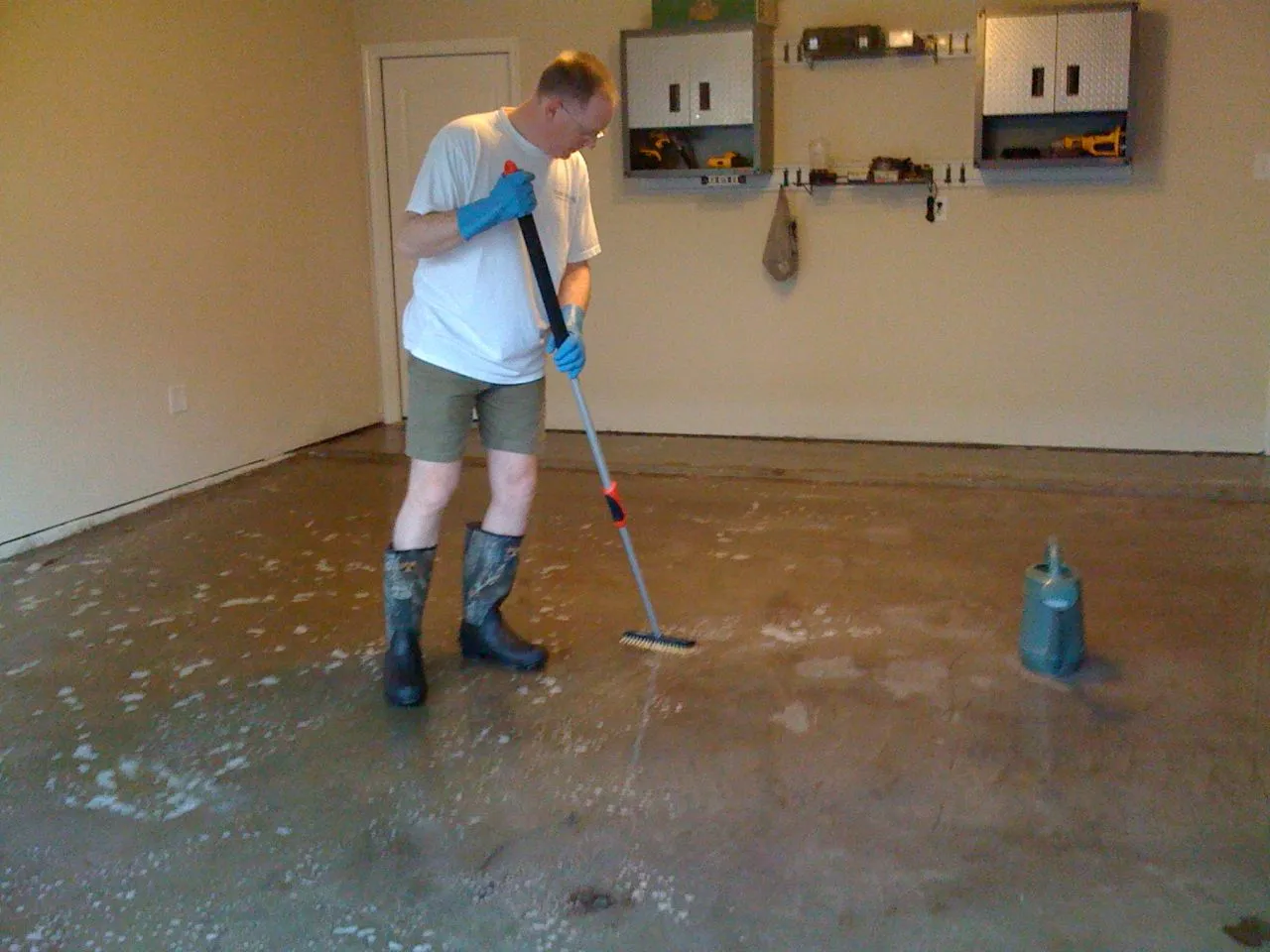
Epoxy floor coatings make garage floors tougher and more resilient. Epoxy floors manage to withstand the impact that a simple concrete floor won’t be able to handle. Moreover, even after a severe beating, the floor coating will stay shiny and smooth. The epoxy garage floor is easy to maintain. With the right care, the coating will be able to stay shiny for years.
Cleaning epoxy garage floors
If you want your floor surface to be in good condition and be able to handle the impact, you need to know how to perform routine maintenance cleaning. It will help to keep the floor clean and last for a long time.
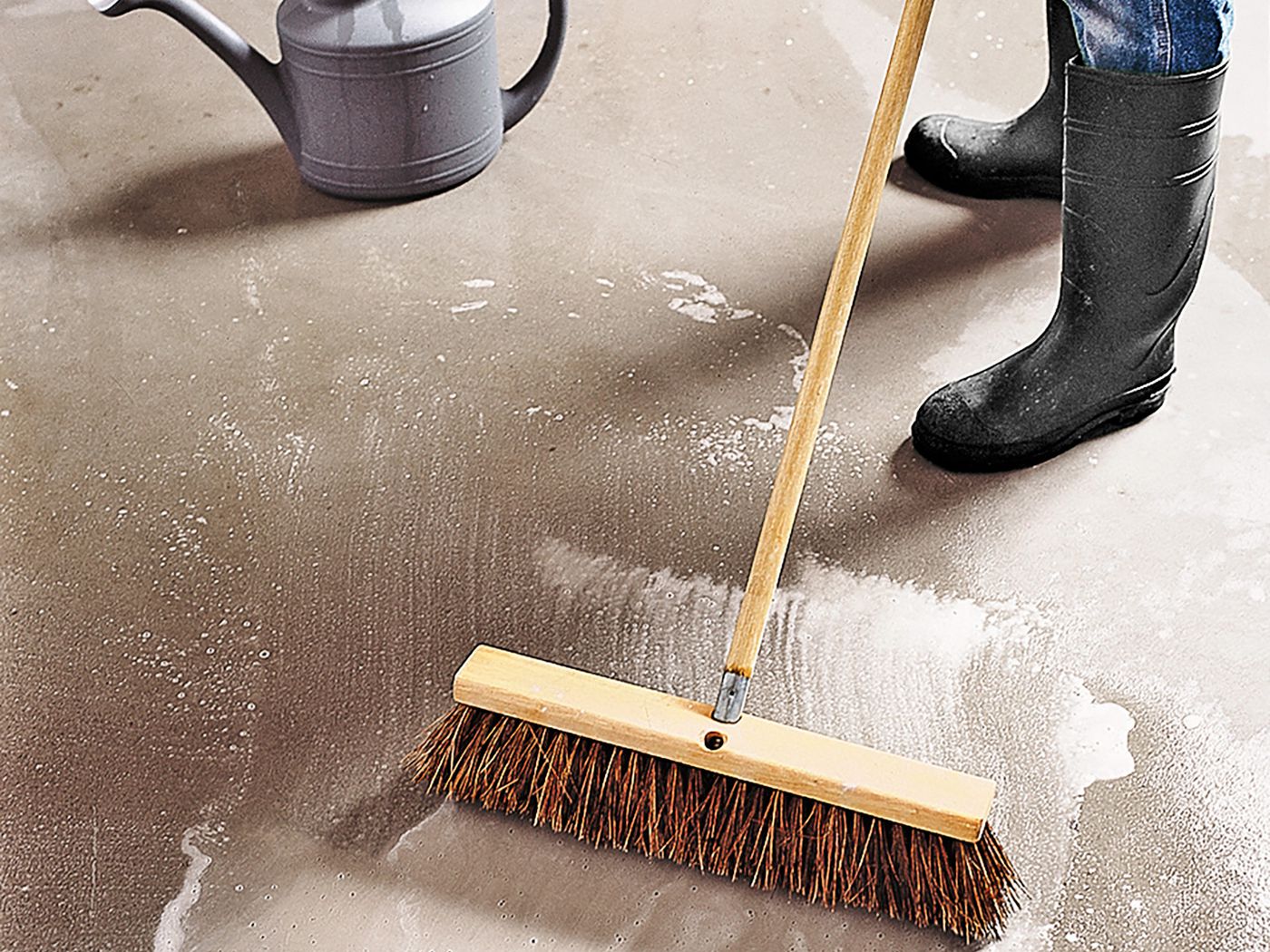
Before we go straight to cleaning, we shall discuss how you sterilize epoxy floors since it is also an essential part of keeping your floors in a good condition. To sterilize the floors, you can take advantage of regular dishwashing liquid.
Mix dish-washing liquid with water. The ratio is 1/3 cup of dish-washing liquid for 5 liters and water. And then simply mop the floor. This method won’t allow any hazy film to be left on the coating.
Don’t allow dirt to remain on the floor coating
The dirt and grit that remain on the epoxy floor surface can soak into the coating. This will lead to scratching of the floor over time. This usually happens when you move heavy machinery across the floor.
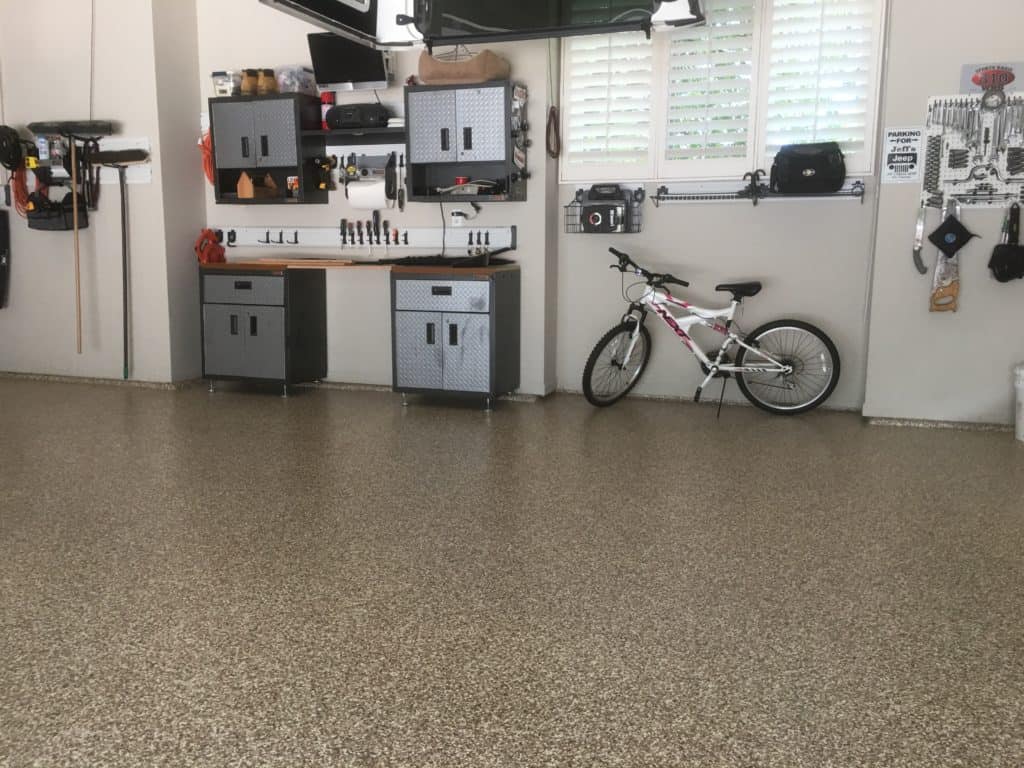
The dirty epoxy floor is likely to lose some of its qualities, for example, water resistance. To prevent this, you need to perform regular cleaning.
Use a vacuum or a broom
It is recommended to sweep the entire floor regularly. For this, you can use a broom or vacuum the floor with a soft brush attachment.
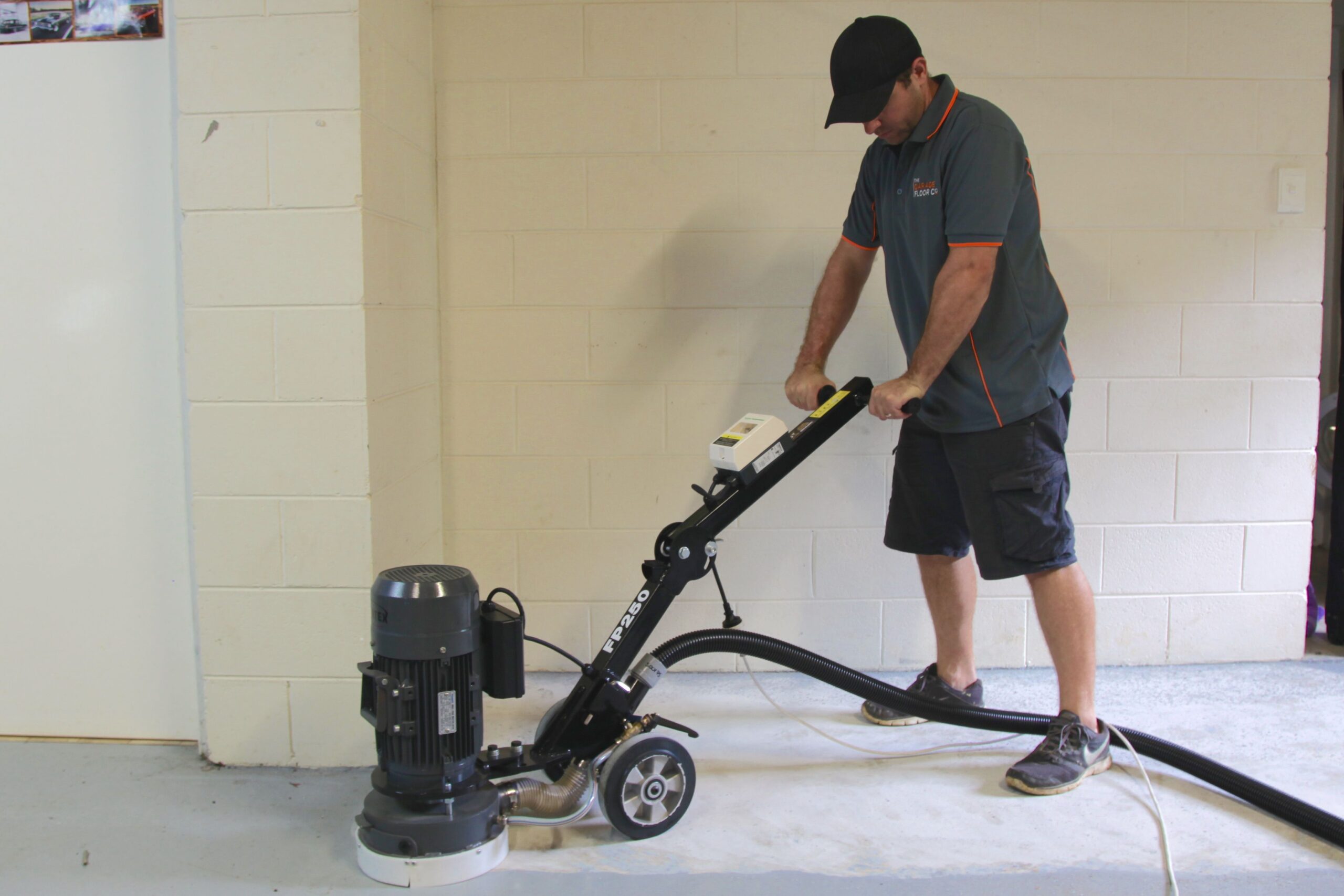
In order to prevent damaging the floor, it is crucial not to wash it and scrub it when you haven’t got rid of dirt particles. You should sweep the floor twice a week.
Use a mop
The next step is using a microfiber mop soaked in warm water. Wring out your mop to avoid dirt scratching the epoxy coating. If your floor coating has anti-slip aggregate (for example, aluminum oxide) added to the formulation, it is better to use a soft bristle brush or at least a soft dust mop, since they are more effective for this type of floor.
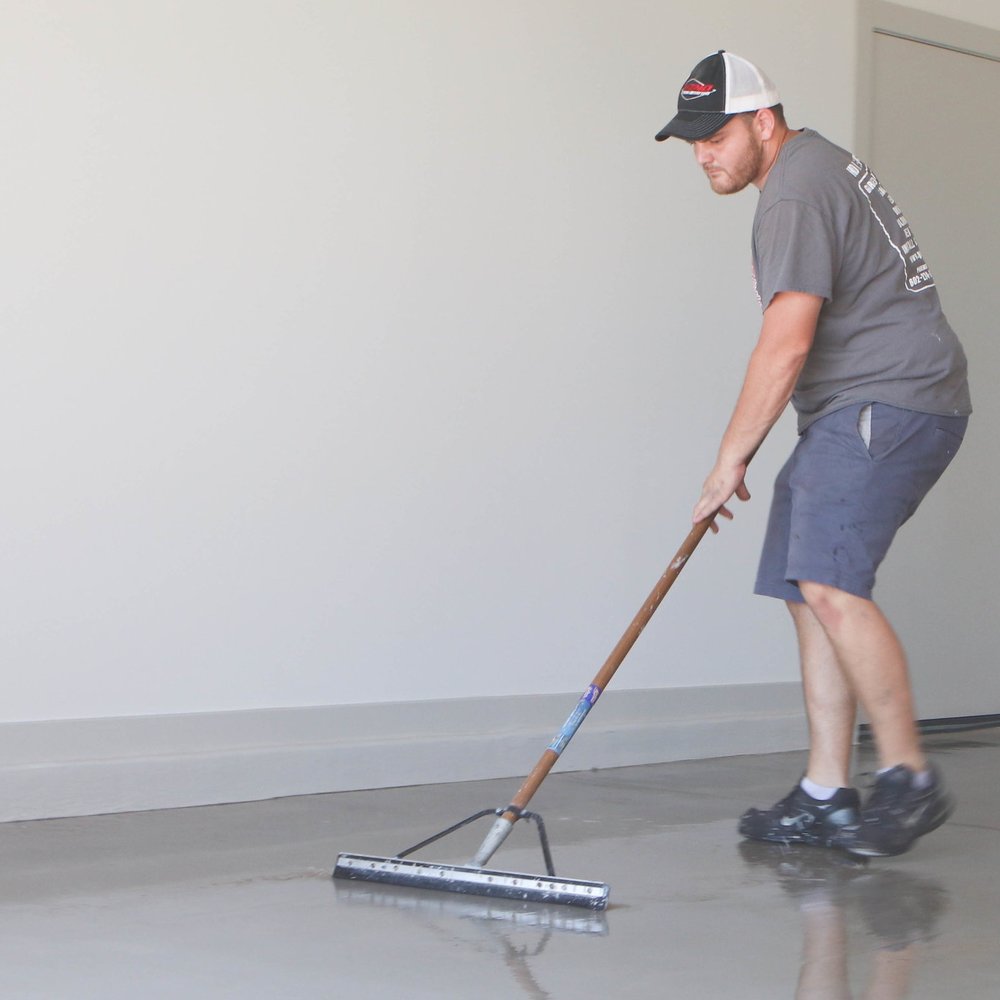
Sometimes even after mopping, some dirt particles remain on the floor. To remove those particles, you can take advantage of the squeegee. Avoid using a metal frame squeegee since it may damage the epoxy coating. Moreover, it is not recommended to use scrapers with metal blades since they can destroy epoxy flooring.

If you are wondering which mop is better for regular care, many people admit the benefits of microfiber mop. Note: when you clean the epoxy floor with a mop or a bristle, you are allowed to pressure the floor. It will not cause any harm or side effects.
Cleaning solutions
In case the previous steps didn’t help, you should use a cleaning solution. There are different types of solutions, but you should be aware of solutions that contain aggressive chemicals or those which are produced on a soap basis. They will only damage the floor, make it slippery, and leave a hazy film.
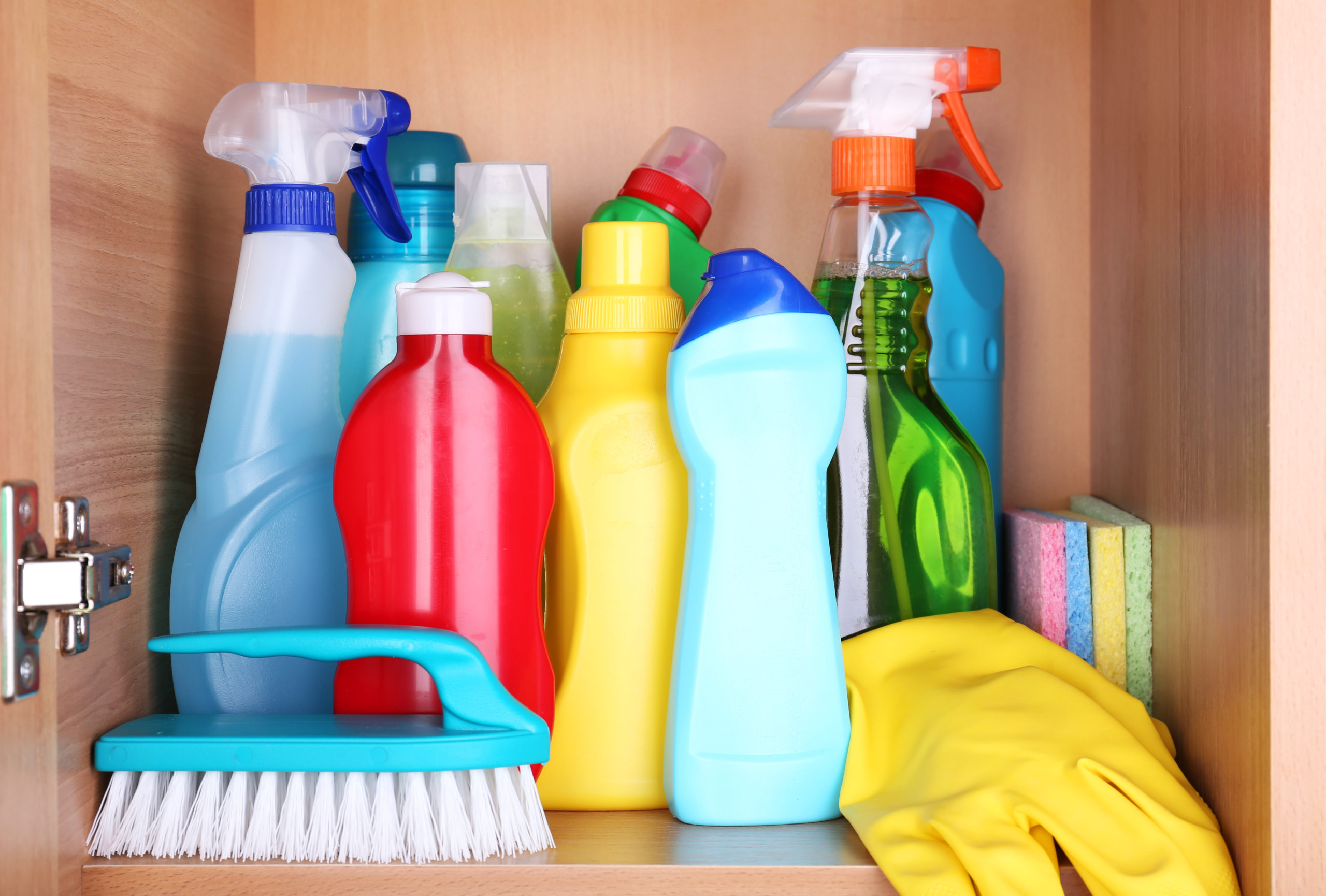
Mix one gallon of hot water with 1/2 cup of Simple Green. You can also use ammonia instead of Simple Green. They are both completely safe for your epoxy flooring. Simple Green is more suitable for serious cleaning. When you use Simple Green, remember that it leaves a film on the epoxy floors.
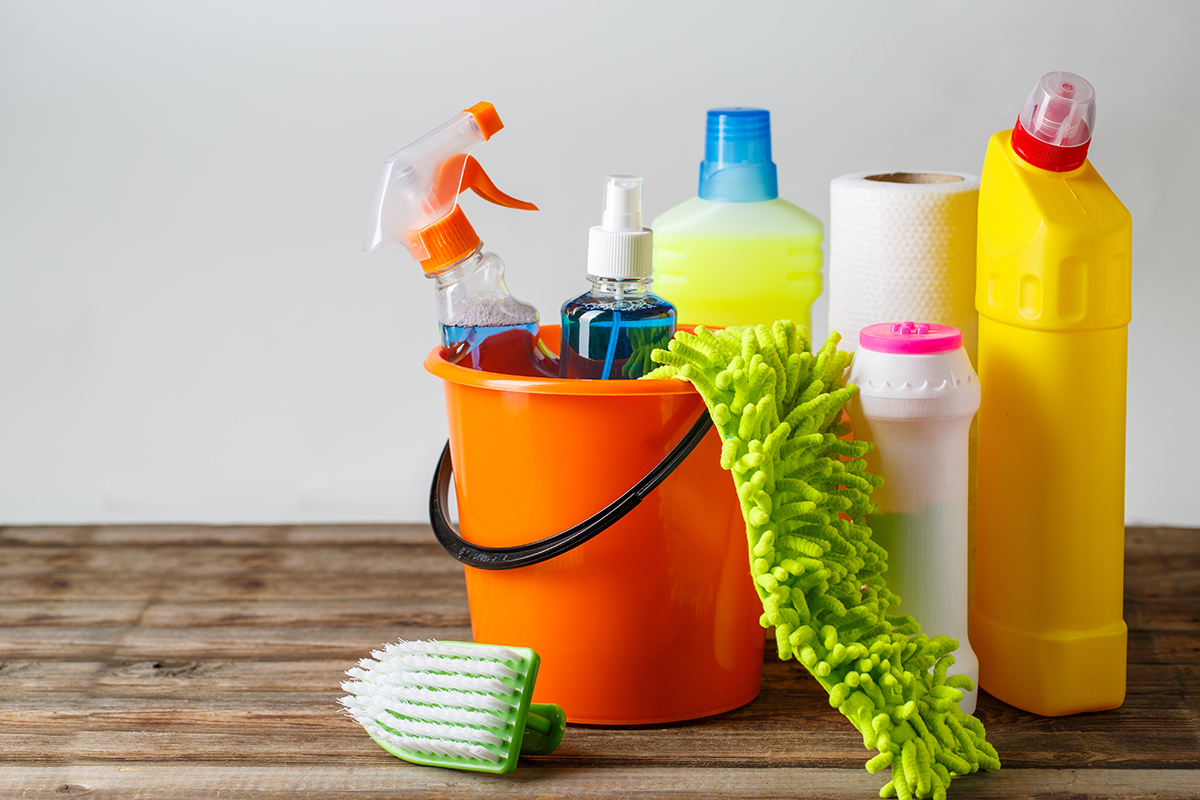
Before using a cleaning solution, it is recommended to remove all the grime and grit with the help of a hard foam mop. It will also help to remove all the surface dirt. You can also spray the cleaning solution on the epoxy floor coating and scrub it with a stiff bristle nylon brush. Then let the floor air dry, or you can use a microfiber shop towel or soft dust mop to wipe the floor.
Spot cleaning of the epoxy floors
If you spilled a liquid on the epoxy floor, you would like to perform some spot cleaning. Since the epoxy garage floor is water-resistant, you will perform the cleaning with ease.
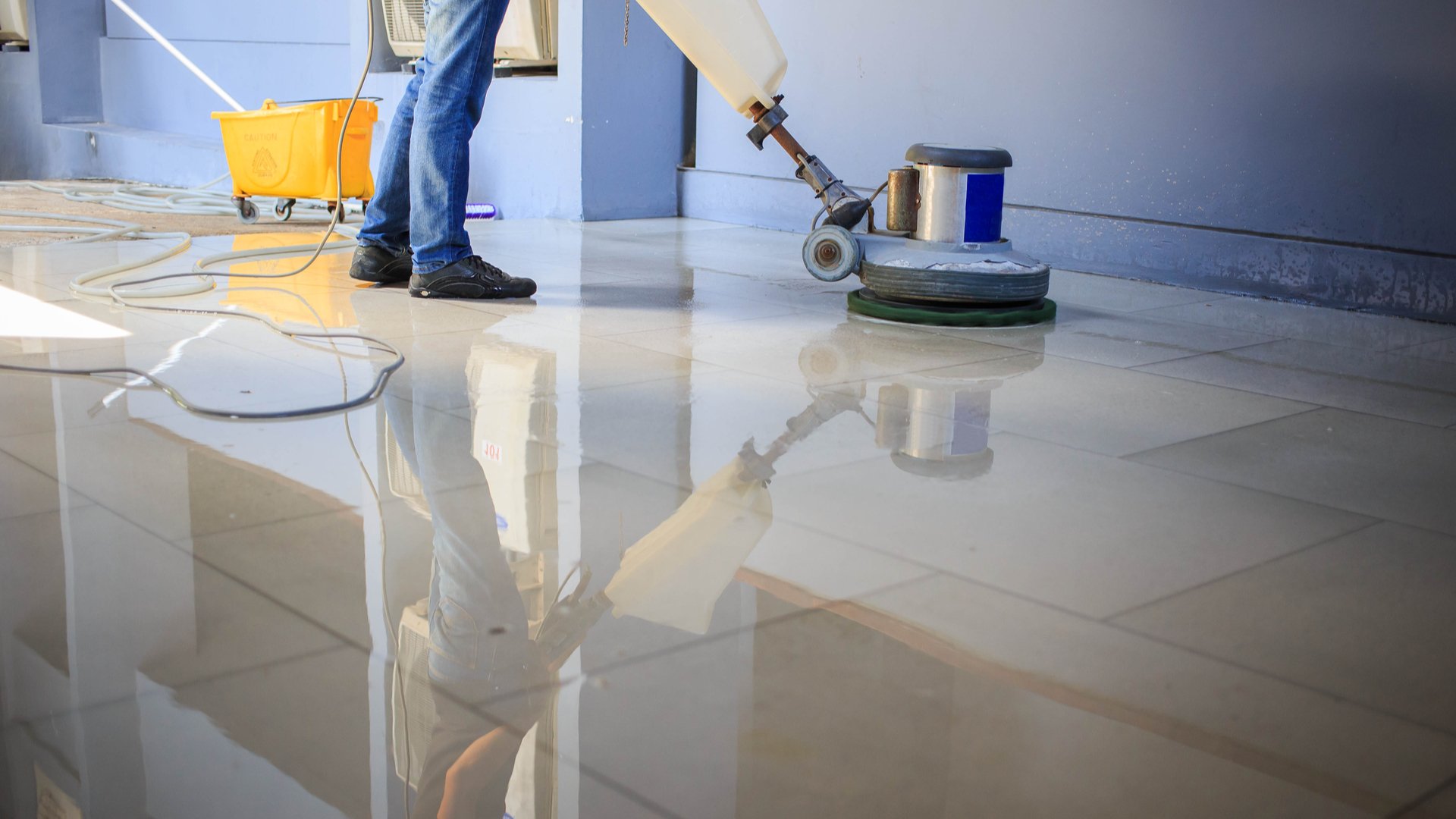
Use a shop vacuum to remove the liquid alongside every dirt in that area. The next step is wiping the spot with a mop soaked in warm water. If the spot you want to clean is small, you can take advantage of a soft scrub pad, but don’t scrub too hard.
If you deal with oily or chemical spills, you should remove them immediately since they will easily damage epoxy garage floors. To prevent this, use a shop towel or a paper towel to wipe up the spills. It concerns engine oil spills, gas spills, antifreeze, paint, harsh household cleaners, abrasive or coarse liquids, and so on.
Many people don’t realize that all those chemicals should be immediately cleaned. Otherwise, your floor will be discolored and damaged. If the chemical spill is sticky and leaves a film on the epoxy coating, it is recommended to use a cleanser like Windex to gently remove it.
We also recommend you keep a neutralizing agent ready to hand. It will help to neutralize the chemicals. Then you can remove them with the help of a soft cloth or squeegee.
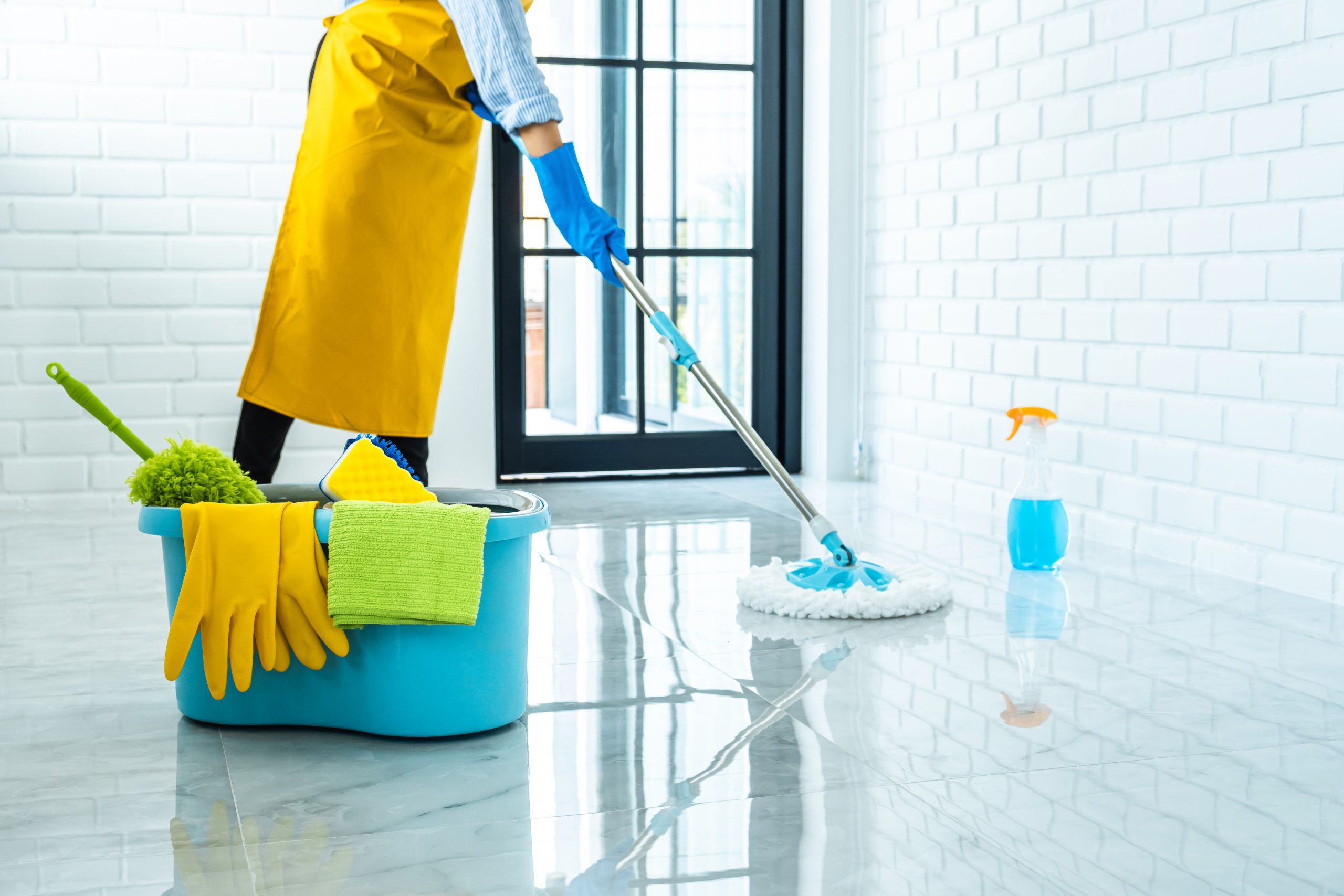
In addition, sometimes before performing spot cleaning, the first step is to remove solid debris and accumulated dirt. For this, use a degreaser and a shop towel. Then you need to mop the epoxy floors with hot water.
You should always keep some towels at hand to quickly remove all the spills and don’t let the floor be damaged. The same with a neutralizing agent. The spills of chemicals are not only dangerous for destroying the coating of your floor. They can also cause headaches, allergic reactions, and respiratory issues.
Note: never leave the epoxy floor wet. When the flooring surface is clean, remove all the residual cleaners and excess water. It will help to stave off mold and mildew growth.
Actually, you don’t need to clean the whole floor every day, but you definitely should clean the spots that need extra attention. It will save you a lot of time and make your floors last long.
Cleaning stains on the epoxy garage floor
Sometimes you can remove stains you can handle it by using only warm water, a kitchen scrubbing sponge, or a soft deck brush.
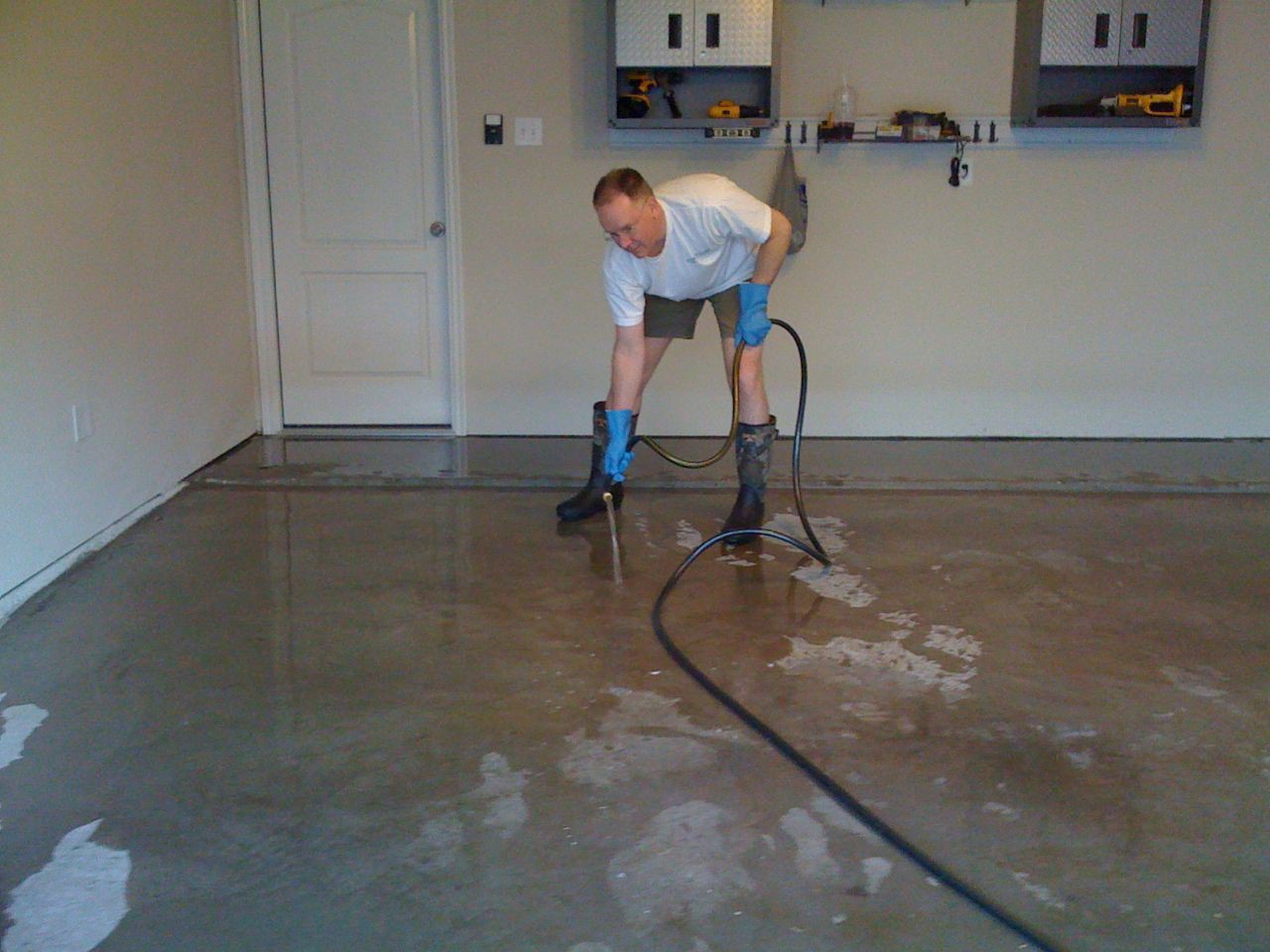
However, sometimes you deal with tough stains that cannot be removed so easily.
Deep cleaning of your epoxy floors and removing tough stains
Once a month, you should perform a deep cleaning of your epoxy floors. The first thing you should do is remove all the furniture, tools, and so on to achieve all the areas.
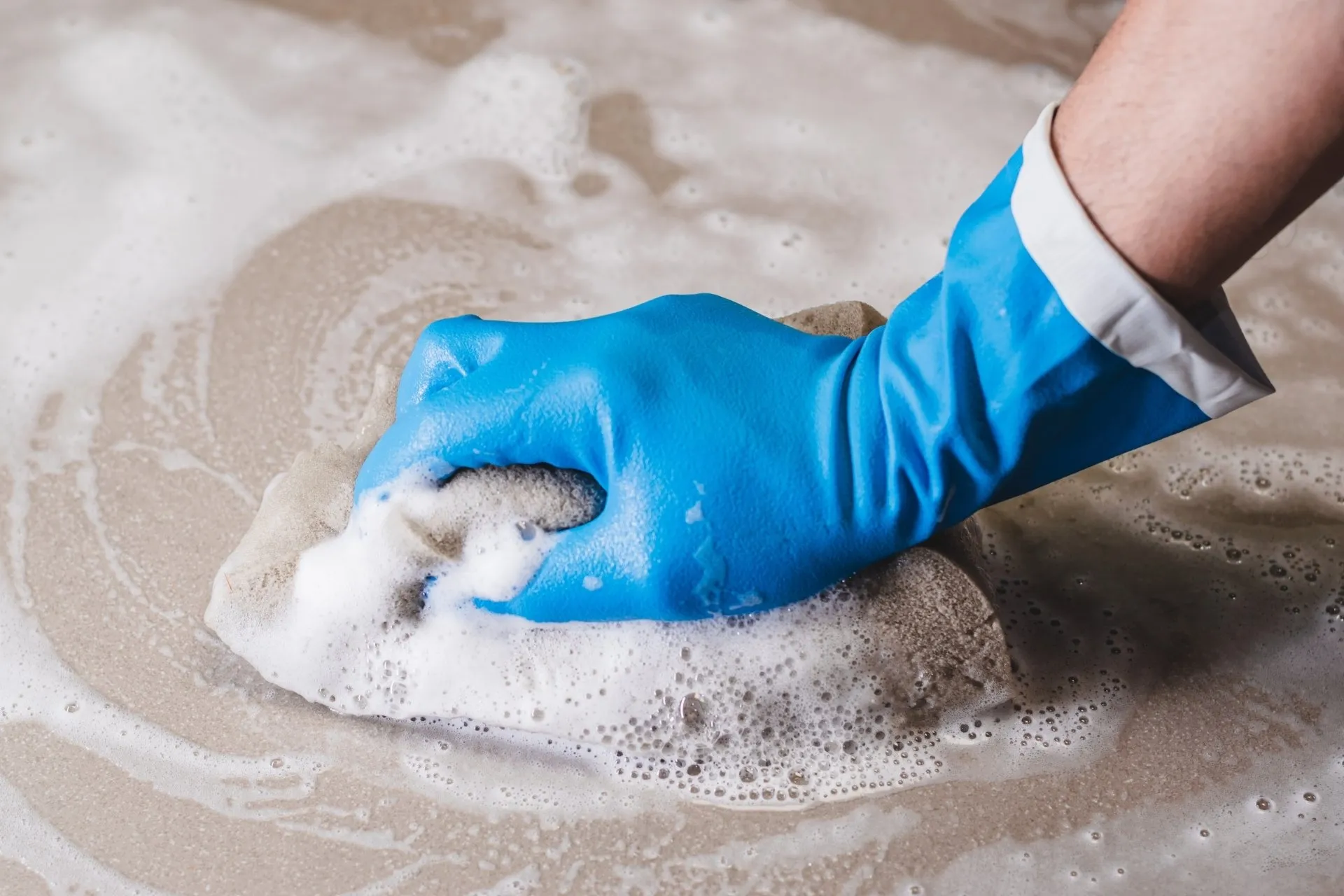
The next step is choosing the right epoxy floor cleaning products. The best option for removing stains is diluted ammonia. Another good option is Windex.
If you use diluted ammonia, add a half cup of ammonia to a gallon of hot water. If you use Windex, mix it with water in this ratio: 1 part of Windex to 3 parts of water. Those products are safe for your epoxy garage floor coatings and won’t leave any film on them.
Removing stubborn stains with a stiff nylon brush
Now you need to apply your solution on the area you want to clean and scrub it with a stiff bristle nylon brush.
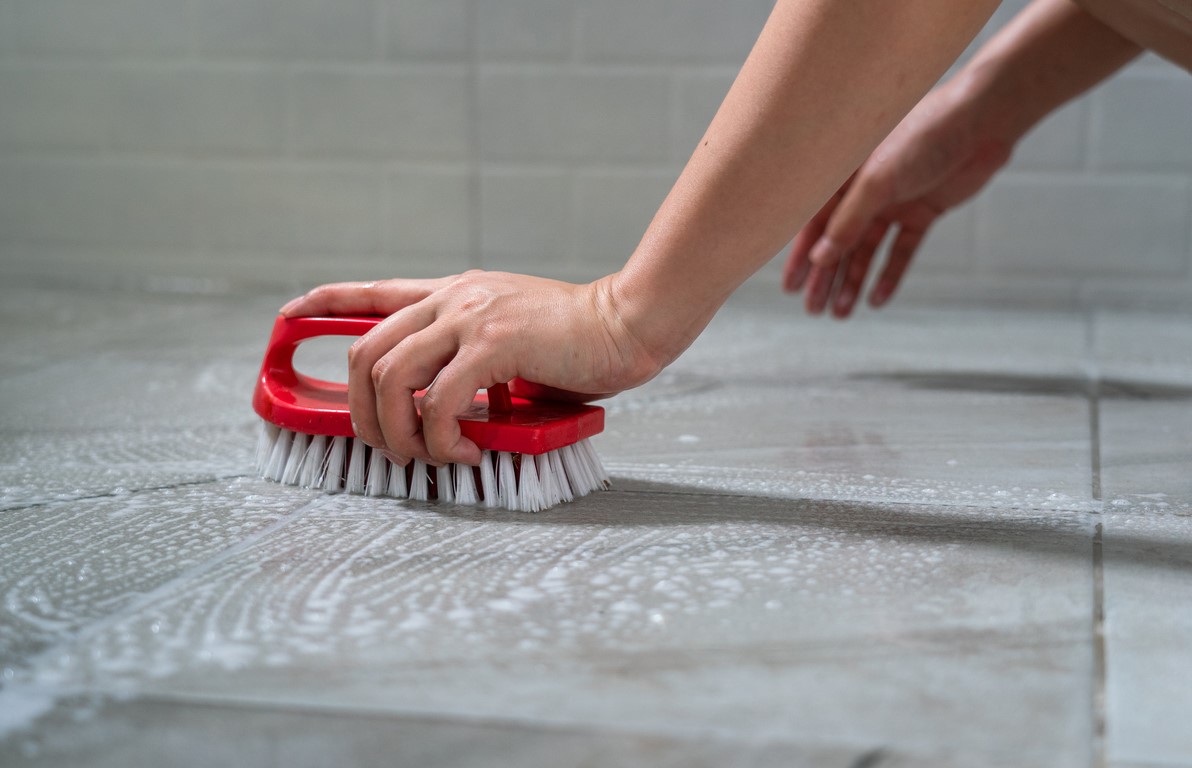
Repeat this until the stain is completely gone. Then rinse this area with water and use shop towels to dry it.
How to remove rust stains
Rust stains can come off with some difficulties, so it is recommended to use a lactic acid-based cleaner solution. Mix it with water in a 1:1 ratio.
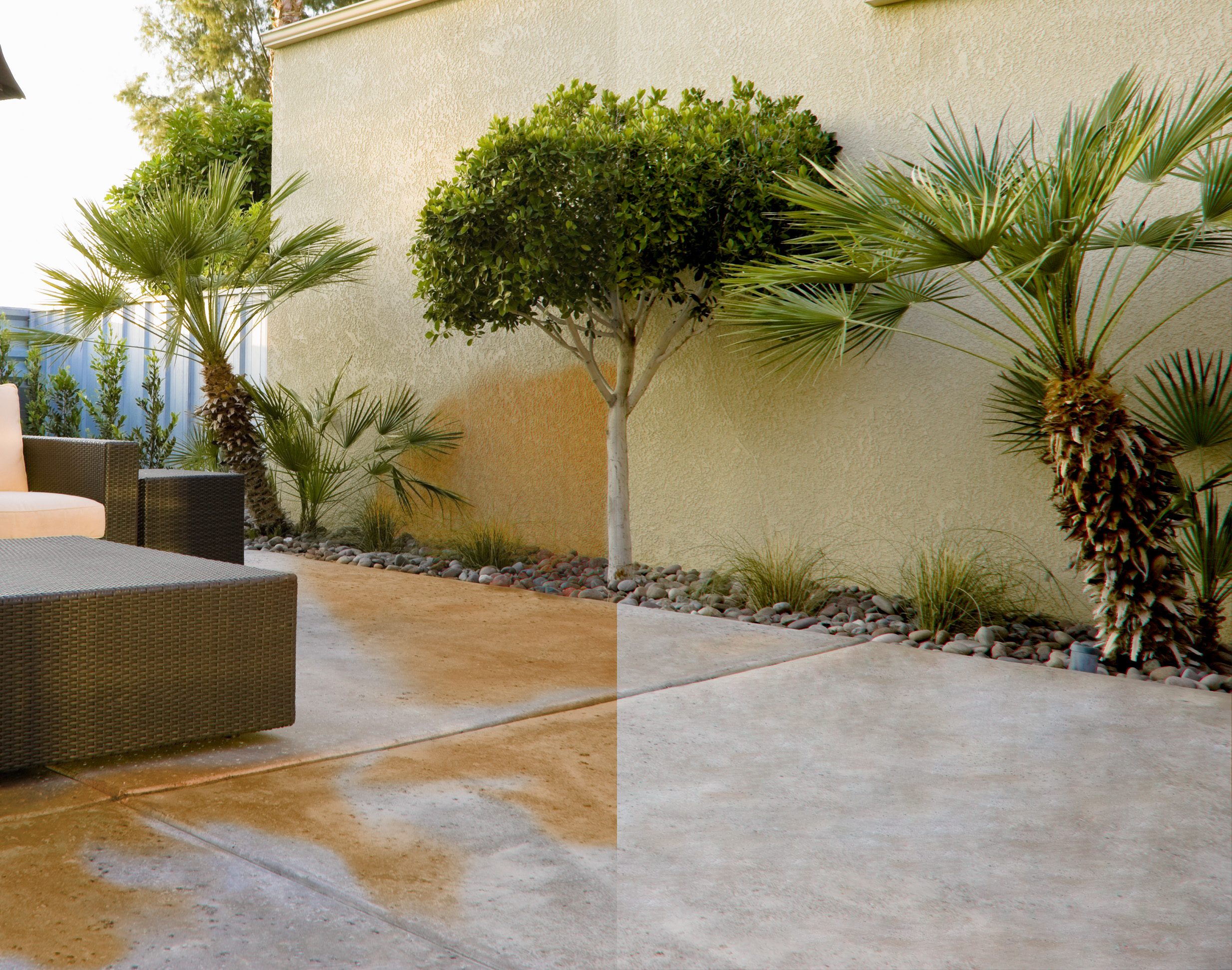
Apply this cleaning solution directly to the area and scrub it. Then rinse the area with cold water and dry it. This solution may also be used for salt film and grease that can remain on your epoxy floor coatings.
However, some rust stains can be easily scrubbed with the help of a soft deck brush and some water.
How to remove tire marks from the epoxy garage floor?
Tire marks are very common to appear on garage floors. The good news is that they are not difficult to be removed. It is recommended to remove them as soon as you notice them on the epoxy coating, cause then they can become hard to come off.
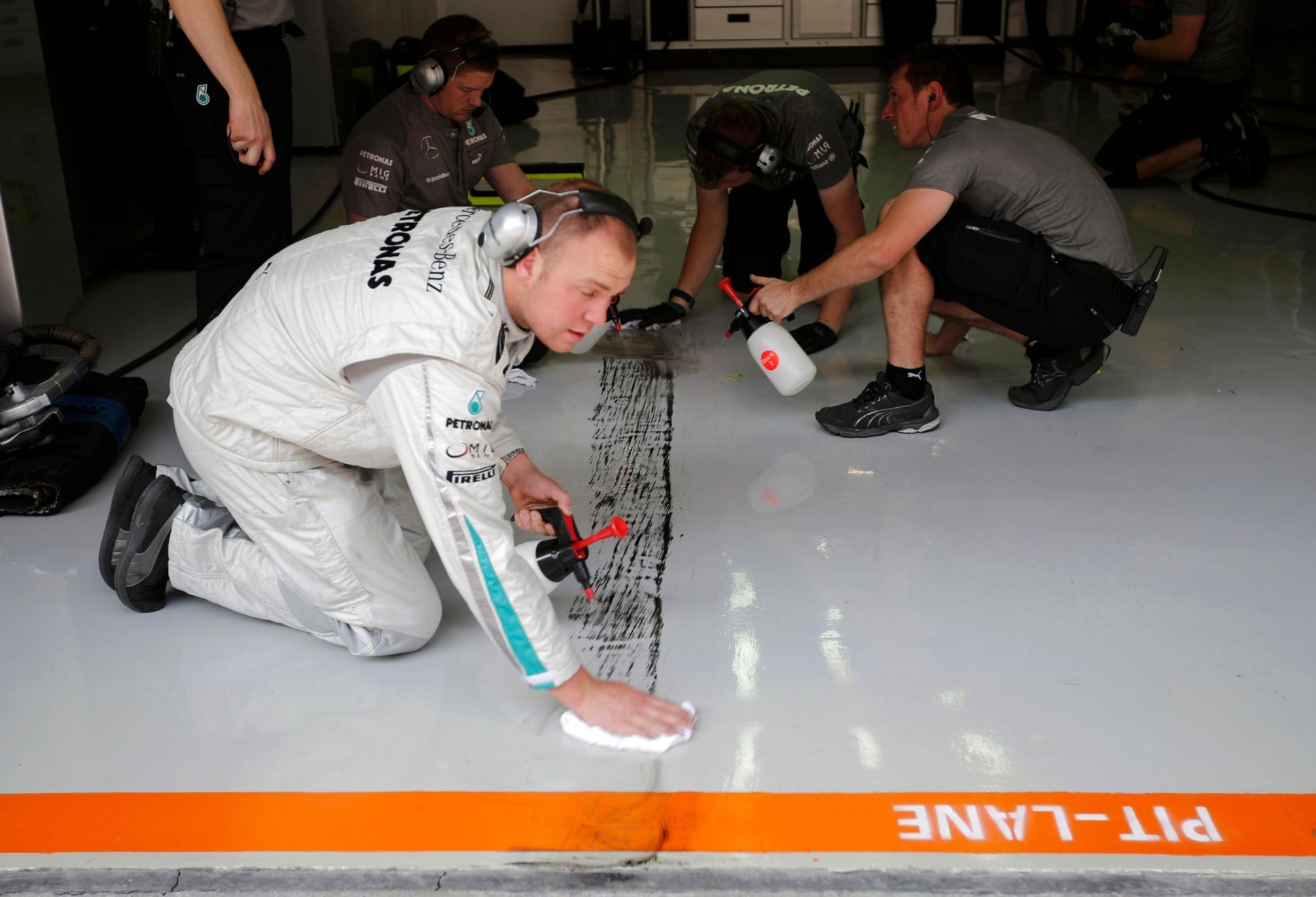
To clean epoxy floors from tire marks, you will need a concrete degreasing product, for example, Simple Green. Drip it on the mark and leave for 10-15 minutes. Then scrub with a stiff brush. If the mark didn’t come off, repeat the same process. If the tire marks are not hard, you can use a soft nylon brush.
After that, rinse the area with cold water and use paper towels to dry it.
What cleaners are not to be used on epoxy garage floor coating?
If you want to keep your surfaces dirt and greet free, you should not only perform routine cleaning but also use some cleaners to remove stains and tire marks. However, not all cleaners are suitable for epoxy garage floors. Using the wrong cleaner may damage your floor.
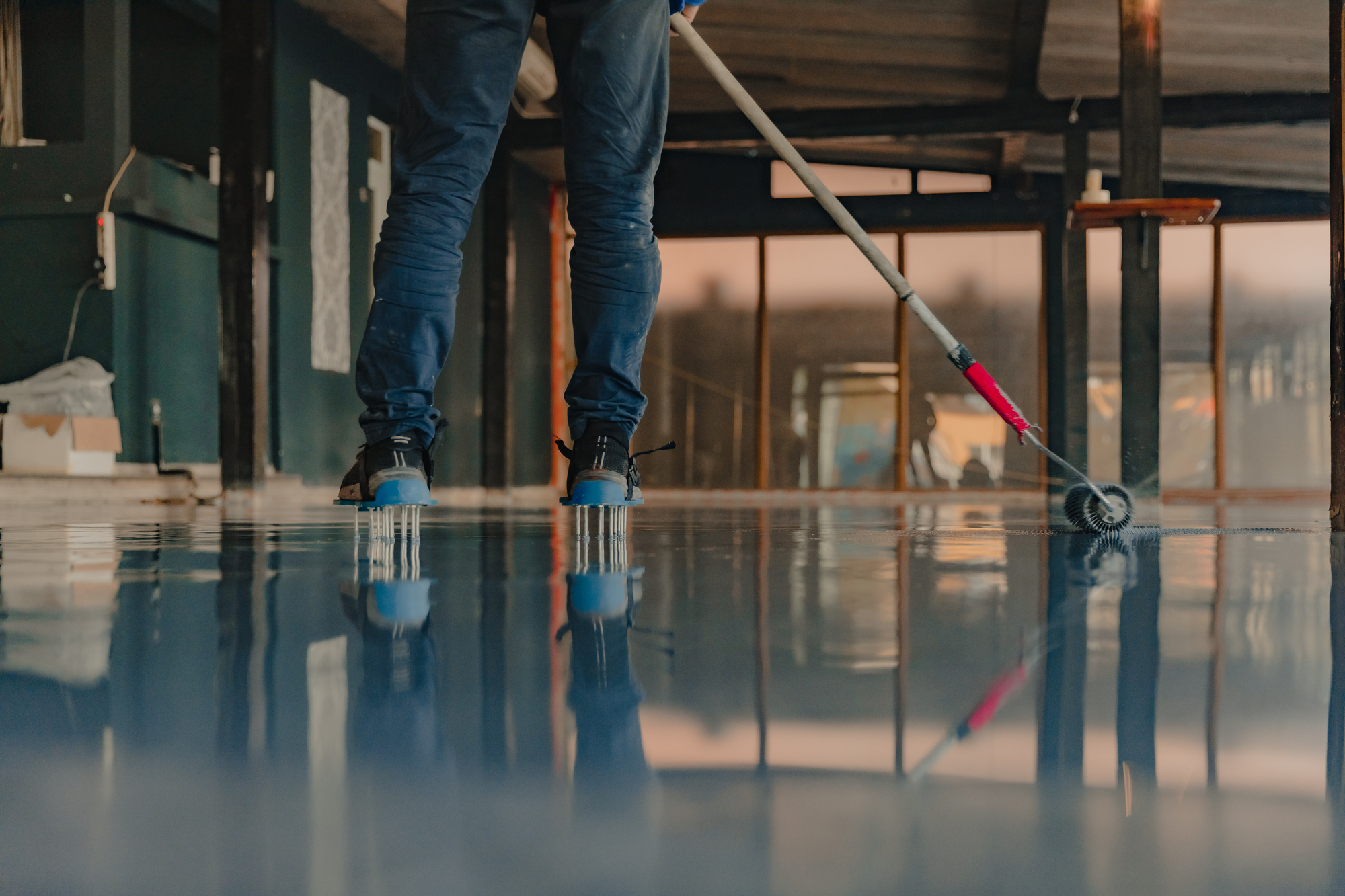
Never use citrus cleaners or vinegar for epoxy floor cleaning. Both of them contain acids that are likely to degloss the finish of epoxy and other floor coatings over time.
It is also not advisable to take advantage of soap-based floor cleaners. Soap-based cleaners can leave streak marks on the floor. And they also can leave some film on your garage floor. Moreover, those cleaners make the floor dull and make it dangerously slippery.
You should also avoid using harsh chemicals (for example, Comet). They can bring serious harm to your epoxy coatings.
The best cleaners you can use for your epoxy floors are diluted ammonium and Windex. Diluted ammonium can handle all types of grime and grease without causing any harm or side effects to your floors. This medium is also effective for floors with salt film and residue.
Windex is also a good medium. It is considered to be more powerful than diluted ammonium, so you should more careful while using it. This cleaner won’t leave any coating on the epoxy floor and will perfectly remove any residue. It is ideal for cleaning the spots that need extra attention.
If you want to remove grease stains, you can take advantage of Tri-sodium phosphate (TSP). You can also use Simple Green, which effectively eliminates grease. It is also safe for your floor, but you still need to be careful since it is considered to be more powerful than diluted ammonium or Windex.
So, you should use Simple Green only in case you need to do a serious cleaning. For instance, you deal with a worn-out floor or a low-quality floor. The disadvantage of this cleaner is that it can leave a hazy film on the floor. So don’t forget to rinse the floor and use a separate bucket for clean water.
How to protect epoxy floors from damage?
The best thing you can do to make your epoxy garage floors last long is to try to prevent damage.
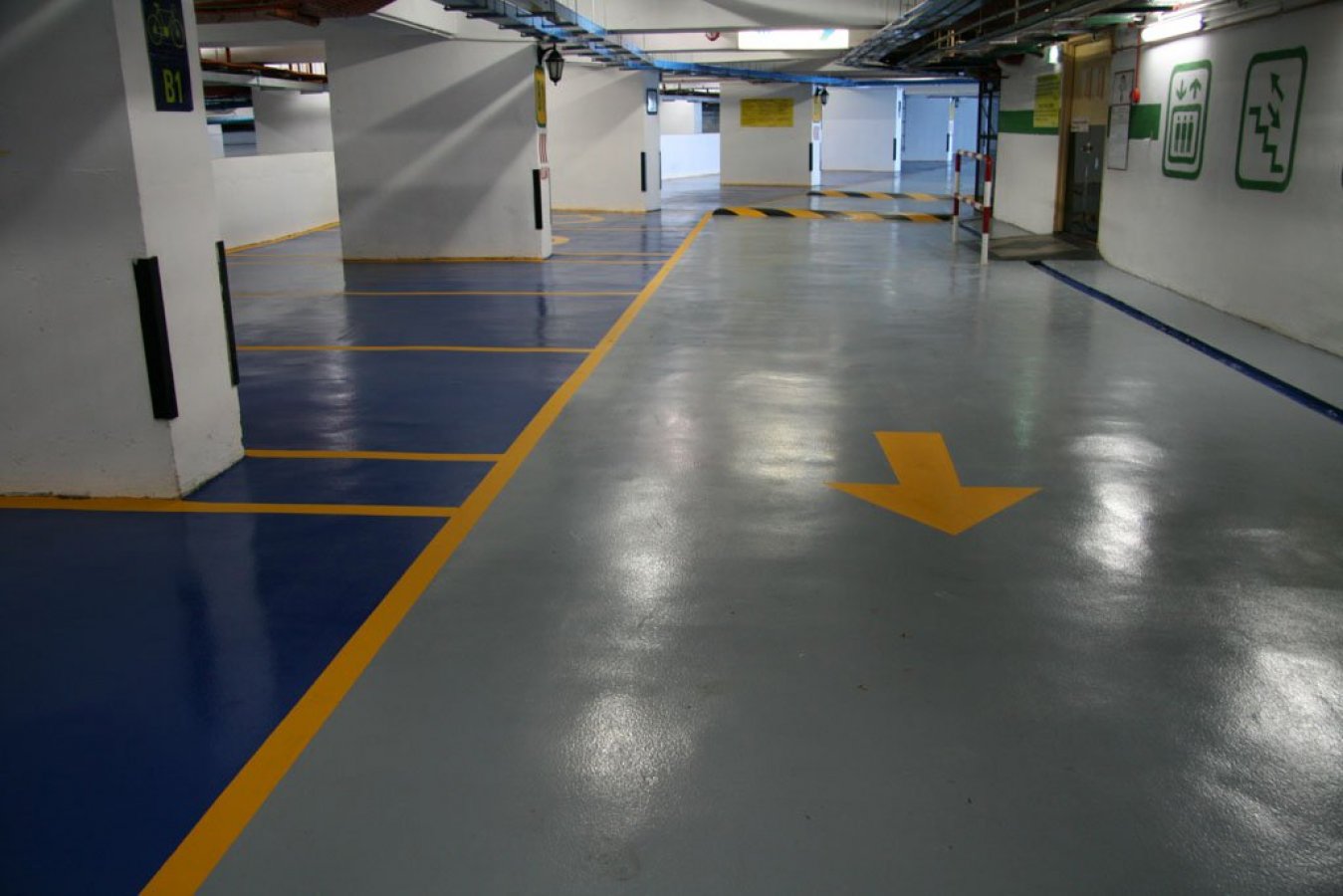
First of all, never drag heavy equipment across the floor. If you are doing an oil change, use a welding mat or plywood to protect the floor from damage. Perform regular cleaning of the entire floor to get rid of dirt and grit.
When you see your epoxy floor losing its gloss, apply wax. It won’t only keep the gloss. A high-quality wax is also a good protection for your floor.
Never use steel wool as a scrubber. It is too abrasive and will leave scratches on the floor.
Once in a few months, you should perform thorough cleaning. This will help to save your floor’s gloss and durability.
Usually, dirt comes with foot traffic and vehicles. A good thing you can do to prevent this is to replace a big doormat or walk-off mat. It will reduce the amount of grit and therefore unwanted scratches. But it won’t completely save your epoxy floor, so you still need to use a mop or a shop vac to perform a cleaning at least once a week.
FAQ
How can I make my epoxy floor shine again?
If you want to keep your floor system shiny, you should use warm water and Dawn Dish soap, which is considered to be the best way to keep your floors shining. However, sometimes there can remain some spots or stubborn stains that won’t come off. In this case, you should purchase a good cleaning solution or an all-purpose surface cleaner.
Can you use Pine Sol on epoxy floors?
Pine Sol can be used to clean epoxy floors and remove small bits of dirt as a part of regular care. Mix it only with warm water and then perform a cleaning session.
Can you use vinegar to clean epoxy floors?
Vinegar, as well as citrus cleaners and soap-based cleaners, are not to be used on epoxy floors. Vinegar contains acids that will damage the coating.
Can you use Swiffer on the epoxy floor?
You should regularly sweep the garage floor to remove all the debris. For this, you can take advantage of a soft-bristled broom or Swiffer Sweeper. For commercial floors, it is better to use a dust mop.
To draw a conclusion. How do you clean epoxy garage floors?
Epoxy garage floors will bring you a lot of benefits. They are tough, resilient, water-resistant, and durable and will stay shiny even after a severe beating. In addition, they require low maintenance. However, you should keep your floors clean of dirt, any debris, stains, and marks.
For this, you need to perform a simple cleaning at least once a week. Use a vacuum cleaner, mop, or broom for this. Once a few months, you are recommended to perform a deep cleaning of your garage floors. It will help the floors to last long.
If you want to clean some spots or remove stains, be careful with the cleansers you use. Vinegar and citrus cleansers are not to be used on garage floors since they contain acids that are harmful to the coating. Also, be careful not to scratch the floor while cleaning and scrubbing.
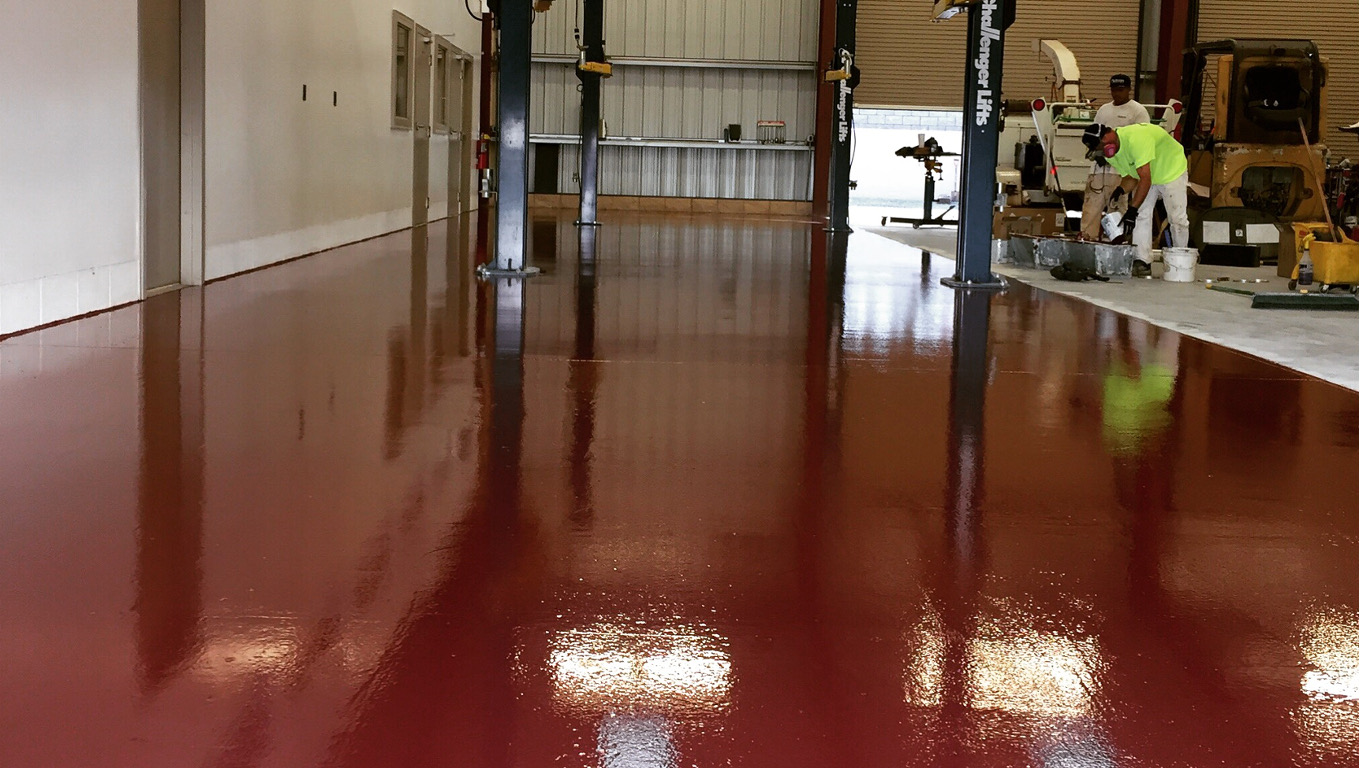
Industrial floors can take good damage, but they still need good care. Always remove the spills of chemicals immediately. To prevent this, use a shop towel or a paper towel, or a soft cloth to wipe up the spills. It concerns engine oil spills, gas spills, antifreeze, paint, harsh household cleaners, abrasive or coarse liquids, and so on.
The best way to keep your floors durable is to take all the necessary measures of precaution. Don’t drag heavy tools and equipment across the floor. In this case, scratching is inevitable. If you are doing an oil change, use a welding mat or plywood to protect the floor from damage. You can also use wax to protect the floor and keep it shiny.
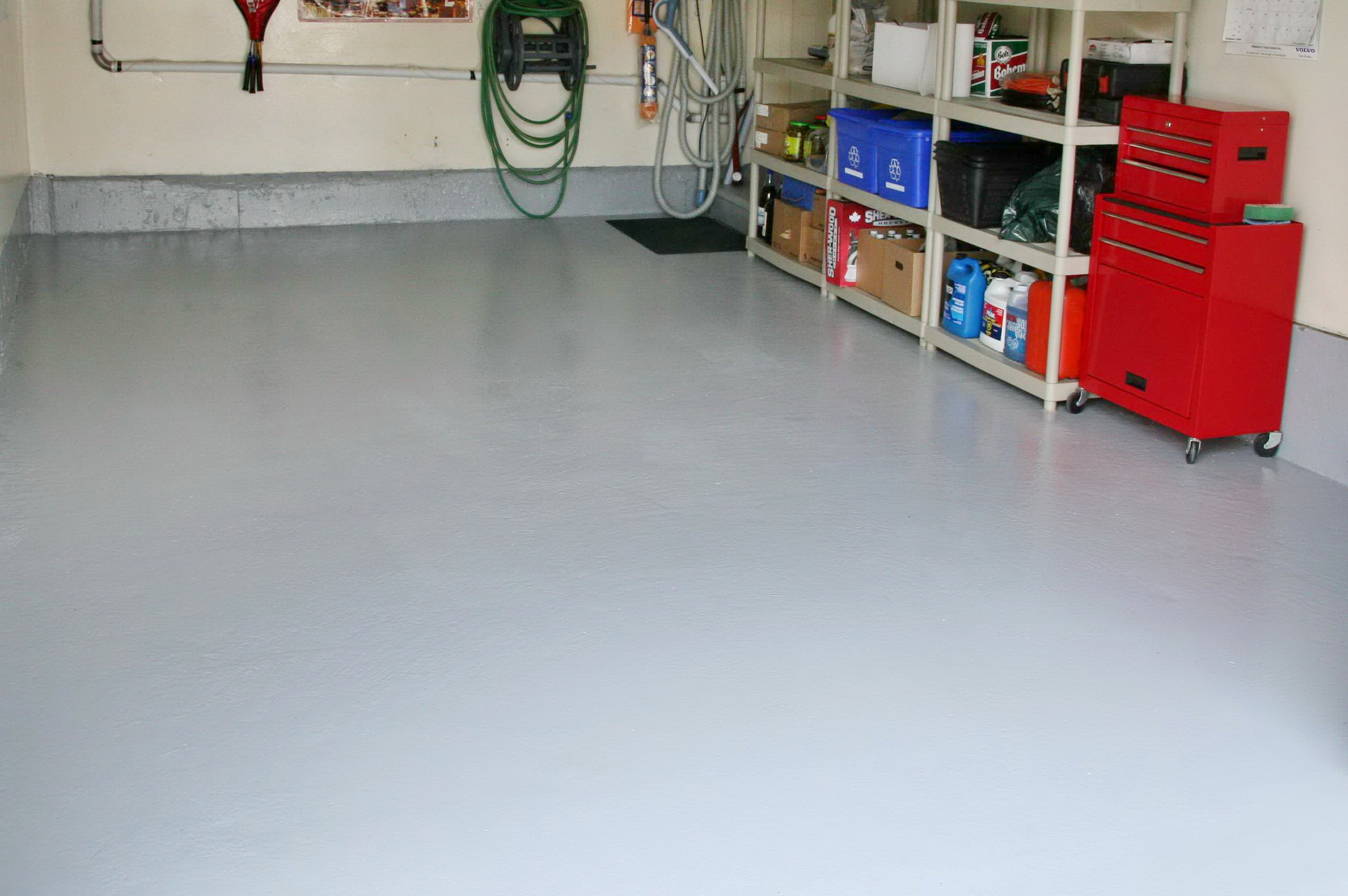
Take regular care of your garage floor, take necessary measures to protect it, remove all the dirt and debris, use the right cleaners, avoid scratching, remove the spills as soon as you notice them, use the appropriate equipment for cleaning and your floors will perform a long lifespan.
